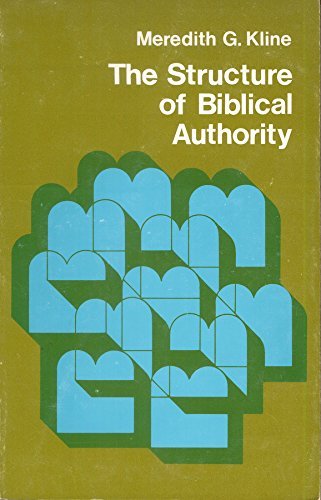|
April 19, 2017 In The Structure of Biblical Authority, the late Meredith Kline (d. 2007) offers in this treatise a
"reinterpretation of the nature of the canonicity of Scripture, based on a re-examination of the history of the formation of the canonical Scriptures from Moses on. The formal model for the biblical canon concept that Kline articulates is found in the ancient Near Eastern treaties; the Bible, the author asserts, is in its literary-legal form a covenantal document, and the biblical canon must be understood as a treaty-canon." (back cover) In chapter two of this edition, Kline makes a striking remark about what I call the Prophetic Appeal, that is, the authority that the Latter Prophets (as they are known) appeal to. He states: "It has often been observed that the Old Testament historical narratives are complementary to the prophetic writings known as the Latter Prophets, providing the necessary framework to understand them. The design of the history, however, went beyond the merely literary function of providing a background for the interpretation of the prophetic messages. The historical documents were suitable for legal service in the administration of the covenant. They constituted the official record witnessing to Yahweh's fidelity and to the vassal people's continual non-compliance with his commandments. In them the prophets had in hand documentary testimony substantiating their case in their mission as agents of Yahweh's covenant lawsuit against Israel" (p. 57, emphasis mine). When the kings of Israel or Judah were not living in obedience to the law-covenant by not administering justice, when the priests ruled at their own direction, when other prophets seduced the people into Baal worship, to what did prophets like Isaiah (Isa. 8:19) and Jeremiah (Jer. 2:26) appeal? Isaiah answers plainly, "To the law and to the testimony!" (Isa. 8:20) Isaiah states further, "If they will not speak according to this word, it is because they have no dawn." Specifically, the prophets appeal to the covenantal documents of Moses (Kline, p. 59) found in the Pentateuch, especially material found in the book of Deuteronomy. The covenant word was binding because it had come from the Suzerain-Lord I AM, having been written down by Moses (Exo. 24:4; Deut. 31:9). There was no other word or interpretation to appeal to, except the very word(s) of God himself. This is reiterated by Kline in his chapter on the formal origins of the biblical canon. "At Sinai, and again in the plains of Moab, the administration of Yahweh's lordship over Israel was solemnized in ceremonies of covenant ratification. Through Moses, his covenant mediator, the Lord God addressed to his earthly vessels the law of his kingdom. His authoritative treaty words, regulative of Israel's faith and conduct, were inscripturated on tables of stone and in 'the book.' Both these deposits of covenantal revelation accorded closely in their formal structure and ceremonial treatment with the ancient treaties, not least with respect to those documentary features of the treaties that provided the justification for our describing them as canonical" (p. 35, emphasis mine). Kline continues to push the authority point because of its divine source: "It is necessary to insist constantly that the Scriptures, whether the Mosaic covenant documents, which constituted the nuclear Old Testament canon, or any other Scripture, are authoritative--uniquely, divinely authoritative--simply in virtue of their origin through divine revelation and inspiration. Certainly, then, their authority as such is not to be accounted for by looking beyond them elsewhere. As divinely authoritative revelation, documentary in form and with unalterable content, they possess the essential components for a definition of canon properly conceived... The word of God created the heavens and the earth and the word of God created the Israel of God. The Suzerain's word is good; the Suzerain's word is true; the Suzerain's word is law. The authority of the Holy Scripture, for which it ought to be believed, and obeyed, depends not upon the testimony of any man, or Church; but wholly upon God (who is truth itself) the author thereof: and therefore it is to be received, because it is the Word of God. --Westminster Confession of Faith 1.4
CommentsgongSeptember 05, 2018 2:32 PM
thanks foe this post NokolajOctober 30, 2018 12:32 AM
The word of God created the heavens and the earth and the word of God created the Israel of God. free resolutions of windowsNovember 16, 2018 5:44 AM
Amazing post. Billye BeatyAugust 04, 2019 5:23 AM
Thanks a lot for sharing https://www.assignmenthelper.com.au/law-assignment-help/ the content. Really a nice blog and great kind of information is provided by you. woliamMay 10, 2021 10:34 AM
Nice logo, I want to contact with your painter, if you cant connect him with me, I will just hire another one by looking at the resumes. www.resumesuniverse.com is top resume service, free resume review for everyone instagram viewerDecember 30, 2024 2:57 AM
I look forward to hearing more updates from you. This is what I need to find. |
Archives2020 Archives
2018 Archives
2017 Archives
2016 Archives
2015 Archives
2014 Archives
2013 Archives
2012 Archives
2011 Archives
Full Archives
|
|
Before the face of God
|
01.17.25

The Prophetic Appeal
/ email us / / / / Blog Website Design by Gutensite






Comments in this Category
All Comments